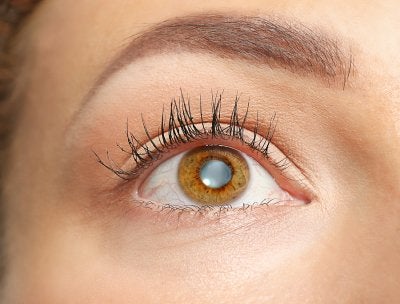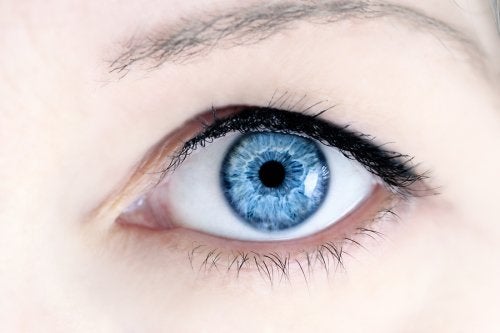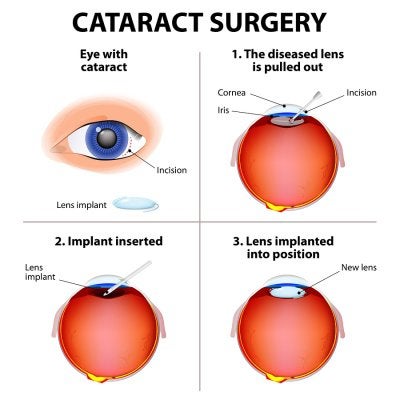-
Adult Risk Factors for Cataracts
 It’s easy to take your good vision for granted, but if something should go wrong, it could change your entire life. If you have not visited an eye doctor in Chicago recently, it’s time to make an appointment. Your eye doctor can spot potential vision problems before you even notice that something is wrong. Cataracts are a common condition that tend to affect older adults, and can lead to blurry, tinted vision. If your cataracts become severe, you may need to consult a custom cataract surgeon in order to restore your vision. Read on to learn about the risk factors for cataracts.
It’s easy to take your good vision for granted, but if something should go wrong, it could change your entire life. If you have not visited an eye doctor in Chicago recently, it’s time to make an appointment. Your eye doctor can spot potential vision problems before you even notice that something is wrong. Cataracts are a common condition that tend to affect older adults, and can lead to blurry, tinted vision. If your cataracts become severe, you may need to consult a custom cataract surgeon in order to restore your vision. Read on to learn about the risk factors for cataracts.Age
Aging is a part of life, but it can bring changes in your health that you may not be prepared for. Cataracts tend to affect people over the age of 60, though there are people who develop cataracts during middle age. Approximately half of adults over the age of 75 have cataracts and may need eye surgery to correct them. Normal proteins inside your eye’s lens can clump together as time goes on, which is what creates the cloudy effect in your vision.
Demographics
In general, women tend to have a higher risk of developing cataracts than men. Like many medical conditions, cataracts can be hereditary, so it’s a good idea to know your family history and find out if any of your relatives experienced them. Individuals of certain ethnicities may also be at a higher risk for cataracts, specifically African Americans and Hispanic Americans.
Medical Conditions
High blood sugar levels can contribute to the development of cataracts, which is one of the reasons why people with diabetes have a higher risk of developing them. In addition, individuals with diabetes are more likely to develop cataracts when they are younger than those without the disease. People with autoimmune diseases such as rheumatoid arthritis, lupus, and multiple sclerosis may also be at a higher risk of developing cataracts because of steroid medications they may need to take frequently. Be sure to tell your eye doctor about your complete medical history during your next eye exam.
-
How Cataracts Affect Your Vision
A cataract is a clouding of the lens that can cause blurry vision. This condition is commonly related to age, but it can happen earlier in life. If your eye doctor tells you that you have cataracts, you might need surgery in order to correct them.
In a healthy eye, the lens is clear and helps focus light so you can see properly. The lens is made of water and protein. With age, the proteins start to clump together to cause cataracts. Check out this video to learn more about the eye and cataracts.
If you do have cataracts, it is important to find a quality eye doctor in Chicago who can help you find the right treatment. With custom cataract surgery, your doctor can remove the cloudy lens and fit you with an intraocular lens that restores your vision.
-
What Are Cataracts?
Cataracts are quite common in older people, but if you haven’t experienced them you may not know much about what they are. A cataract is a clouding of the eye lens that negatively affects your vision. By the age of 80, at least half of the population will have a cataract or have undergone cataract surgery.

Cataracts can happen in both of your eyes or in just one of them. If you’re experiencing any of the following symptoms you may have a cataract:
- Blurred vision
- Faded colors
- Glare from sunlight, headlights, etc. or a halo around lights
- Difficult seeing at night
- Double vision
- Frequent changes in prescription for eyewear
Cataracts typically develop slowly and at first they can be helped by getting new glasses, using anti-glare sunglasses or magnifying lenses, and using brighter lighting. If you haven’t experienced a cataract, it can be compared to looking through a foggy or frosty window.
If you notice any of the previously mentioned symptoms, you should make an appointment for an eye exam. See your doctor right away if you experience sudden eye pain, sudden vision changes, or sudden headaches.
If you haven’t experienced cataracts, it might not be too late to help prevent them from forming. Regular eye examinations can lead to early detection of cataracts. Unhealthy activities like smoking or drinking too much can increase your risk of cataracts. Managing health conditions like diabetes and eating fruits and vegetables with antioxidants can also help prevent cataracts.
Cataract surgery is very common and is a relatively simple and painless procedure to help regain vision. More than three million Americans undergo the procedure each year and 90% of them regain very good vision, from 20/20 to 20/40. You will likely still need reading glasses and may require progressive lenses.
To learn more or schedule an appointment with Gerstein Eye Institute, give us a call today at 773-596-9545.
-
Finding the Best IOL for You
Intraocular lenses (IOLs) allow many people with cataracts to see clearly again. If you’re considering speaking with your ophthalmologist in Chicago about the benefits of cataract surgery with intraocular implants , then watch this video to learn about finding the best IOL for you.
Before your surgery, your ophthalmologist will measure your eye to determine what strength IOL is right for you. The different types of IOL designs will affect how well you will see without corrective eyewear. To determine the best choice of IOL for you, you will work together with your ophthalmologist and consider factors such as the health of your eyes, your vision needs, and your treatment goals.
-
Cataracts 101
Cataracts are an eye condition that typically causes blurry, dim, or cloudy vision. If your ophthalmologist has diagnosed you with this disease and recommended that you consider getting intraocular implants through cataract surgery near Chicago , then watch this video to understand the basics of this condition.
Cataracts are a common eye problem that affects millions of individuals as they age, and it develops when a person’s eye lens, which is normally clear, becomes cloudy. This condition is typically the result of age-related changes that affect the eye and is seen most commonly in individuals over age 60. This condition cannot be reversed, but an ophthalmologist can remove cataracts and restore vision in most cases.
-
Protecting Your Eyes from UV Rays
The light that we get from the sun comes in the form of ultraviolet, or UV, rays. While the first sunny day of spring might improve your mood, exposure to these rays comes with implications for your eye care near Chicago. Talk to your eye doctor about how to keep your eyes healthy , and watch this video on protecting your eyes from UV rays.
Overexposure to UV rays can fade your carpets and furniture, burn your skin, and even damage your eyes. This is why you should do your best to protect yourself from overexposure when you spend time in the sun. Sunglasses can be effective, but you should choose a pair that blocks 100% of both UVA and UVB rays, so be sure to check the label. It’s also a good idea to wear a hat for extra protection. Keep in mind that UV rays can even damage your eyes on cloudy days.
-
What to Expect from Cataract Surgery
Cataracts are common among older adults. These are areas of clouding on the lens of the eye. If you experience blurry vision, worsening night vision, and halos around light sources, your ophthalmologist will evaluate you for cataracts. It can be alarming to be diagnosed with condition that affects something as precious as your vision, but there is an effective treatment option available: cataract surgery . Discuss what you can expect from the procedure with your cataract surgeon serving Chicago.

Preparing for Cataract Surgery
It may not be necessary to have the procedure right away. Many patients find that their symptoms are barely noticeable. When cataracts grow larger and begin interfering with daily life, your cataract surgeon will help you prepare for the procedure. First, you’ll have a thorough eye exam to measure your eye’s size and shape. You’ll likely be asked not to consume food or liquids for 12 hours before your appointment. It will be necessary to have someone else drive you home from the optical center. You’ll be awake during the procedure, but you won’t be able to feel anything because the cataract surgeon will numb the eye. Some people find it helpful to use a prescribed sedative to help them relax.
Undergoing Cataract Surgery
During this procedure, the ophthalmologist removes the affected lens and implants an artificial replacement, which is known as an intraocular lens (IOL). Your surgeon may perform laser-assisted cataract surgery, which relies on a precise laser to make the incision. The lens is broken up and removed through the incision. Then, the new lens is placed. Stitches usually aren’t required because the incision is tiny. The new lens restores both near and distance vision.
Recovering from Cataract Surgery
Immediately after the procedure, your surgeon will place a protective patch over the treated eye. You’ll rest for about 30 minutes to an hour before a responsible adult can drive you home. Follow your surgeon’s instructions for your recovery, which will include using the eye shield for several hours after the surgery and while sleeping. In addition, your surgeon may ask you to take the following precautions:
- Rest quietly for a few days
- Avoid driving until your eye doctor clears you
- Use eye drops as prescribed
- Avoid rubbing or applying any pressure to the eye
- Go to a follow-up appointment
- Call your eye doctor if side effects develop
It’s normal to experience some discomfort, which should go away within a few days. Expect complete healing in four to eight weeks.
-
Are You a Good Candidate for Intraocular Contact Lenses?
Are you tired of having to wear glasses or contacts to see well? If so, then you may be interested in treatment with intraocular implant lenses, or IOL. These lenses work similarly to contact lenses, but they are implanted into your eyes, offering you a more permanent form of vision correction. When determining your candidacy for IOL, there are several factors that your ophthalmologist near Chicago will consider.
Whether or not your eye doctor will recommend intraocular lenses can depend on your level of visual acuity. IOLs are considered ideal for individuals who have severe myopia, or nearsightedness, and are often advised for patients whose high level of myopia makes LASIK a poor choice. If you have nearsightedness greater than -10 or -11 diopters, then you could be a candidate for IOLs. If you’re interested in learning more about whether this procedure is right for you, then schedule an appointment with your eye doctor for an intraocular lens consultation.

-
Tips for Preventing Eye Injuries Around the Home
With the growing popularity of DIY projects and home improvement repairs, it may come as no surprise that eye injuries that occur at home are on the rise. As part of your family’s ongoing eye care near Chicago, use the following tips to help prevent eye injuries around your home.

Inside the Garage
Unsurprisingly, many household eye injuries occur inside the garage or workshop. In many cases, these accidents result due to a lack of protective eyewear. If you are using chemicals, working with tools, securing items with bungee cords, or doing a task that creates dust or other eye irritants, it’s important to use caution. Due to the dangers that these activities can pose, eye doctors advise that you and anyone nearby wear protective goggles to help avert accidents.
In the Yard
While people often worry about the safety of using a lawnmower due to the sharp blades, this type of equipment can present a different kind of hazard. While they may seem innocuous, the pieces of grass and the dust particles that become airborne as you mow can be a threat to your eyes, so use protective eyewear for this task. The same eye care advice goes for using power trimmers on your shrubs and hedges.
Inside the House
Many of the eye injuries that occur inside the home involve chemicals and hazardous items such as bleach and household cleaners, so always wear protective goggles when necessary, and wash your hands after using these products to avoid getting them into your eyes. If anyone in your household uses curling irons or other heated styling devices near their face, remind them to take care when using these appliances, so they can avoid inadvertently making contact with their eyes. Also, eye injuries can occur when cooking due to splashing oil or other hot liquids, so always take care while in the kitchen. Finally, eye doctors advise that you always use caution while drilling or hammering, and even while opening champagne bottles, to help avoid injuries.
-
Raising Awareness on Cataracts
Cataracts are a common health condition, but many people still do not understand the causes, symptoms, and their own risk factors. The good news about cataracts is that, with early treatment by your eye doctor, treatments including cataract surgery in Chicago can save your vision and prevent permanent eye damage. In honor of May’s Cataract Awareness Month, take a moment to learn about this common vision problem and ways you can save your sight if it happens to you.

What Are Cataracts?
Cataracts cloud the lenses in your eyes, obscuring your vision. They can occur in one eye or both, but they are not contagious and cannot be transferred from one eye to the other. According to the National Eye Institute , over half of people over age 80 have at least one cataract or have had cataract surgery. Although they are commonly associated with aging, anyone can develop a cataract at any time.
What Are the Causes?
Cataracts are caused by proteins in your lenses that clump together to make your vision look cloudy. Age is the most significant risk factor, but smoking, excessive alcohol use, excessive sun exposure, and some chronic diseases, such as diabetes, can also increase the chances of developing cataracts.
What Are the Symptoms?
The first symptom many people with cataracts notice is cloudy vision. You may also notice that colors seem faded or that you’re experiencing double vision in the affected eye. Glare from headlights and lamps often seem more intense with cataracts, and night vision may worsen. Needing to adjust your eyeglasses or contact lenses prescription frequently could be the result of a growing cataract.
What Are the Treatments?
For some patients, eyeglasses work as an initial cataract treatment. If the cataract grows, surgery may be necessary. During cataract surgery, the damaged lens is removed and replaced with an artificial one. Even if your cataract does not interfere with your vision, you eye doctor may recommend that it be removed if it makes eye exams difficult or makes it more complicated to treat other eye conditions.
